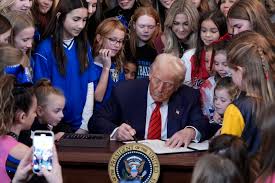The Trump Administration has made a significant impact on transgender participation in women's sports at the collegiate level. Following President Trump's orders, the N.C.A.A. has banned transgender women from competing in women's college sports, sparking controversy and legal challenges.
The N.C.A.A.'s decision, influenced by Trump's policy changes, aims to establish national standards for transgender athlete eligibility in women's sports. President Trump's executive orders emphasized the importance of upholding biological distinctions in sports, leading to the exclusion of transgender women from female sports categories.
The previous policy left decisions regarding transgender athletes to individual sports governing bodies, resulting in varying rules and regulations across different sports. The new N.C.A.A. policy enforces restrictions on transgender women athletes to compete based on their assigned gender at birth, aligning with Trump's directives.
Legal experts and advocates have raised concerns about the implications of these policies, highlighting the potential impact on gender equality and opportunities for women in sports. Critics argue that the focus on transgender athletes detracts from addressing broader issues of gender inequities in athletic programs.
The Trump administration's approach to transgender participation in sports reflects a broader shift in federal policy regarding Title IX and gender equity. By defining sex as "immutable biological classification," the administration has signaled a new direction in enforcing regulations related to transgender rights and sports participation.
While the exact number of transgender athletes in N.C.A.A. sports remains unknown, estimates suggest a small percentage of athletes identify as transgender. The enforcement of these policies could have far-reaching implications for transgender individuals' participation in organized sports at all levels.
The N.C.A.A. and other athletic associations face challenges in implementing and enforcing gender eligibility standards in accordance with federal directives. Legal battles and public debates are expected to continue as various stakeholders navigate the complexities of transgender inclusion in sports.
Amidst ongoing debates and legal challenges, the fate of transgender athletes in women's sports remains uncertain. The Trump administration's efforts to redefine gender regulations in sports have sparked backlash and calls for advocacy to protect transgender rights and inclusivity in athletics.
Looking ahead, the landscape of transgender participation in sports is likely to evolve as legal interpretations and societal attitudes shift. The intersection of gender identity, athletics, and federal policies underscores the ongoing complexities of ensuring equity and fairness in sports for all individuals.

